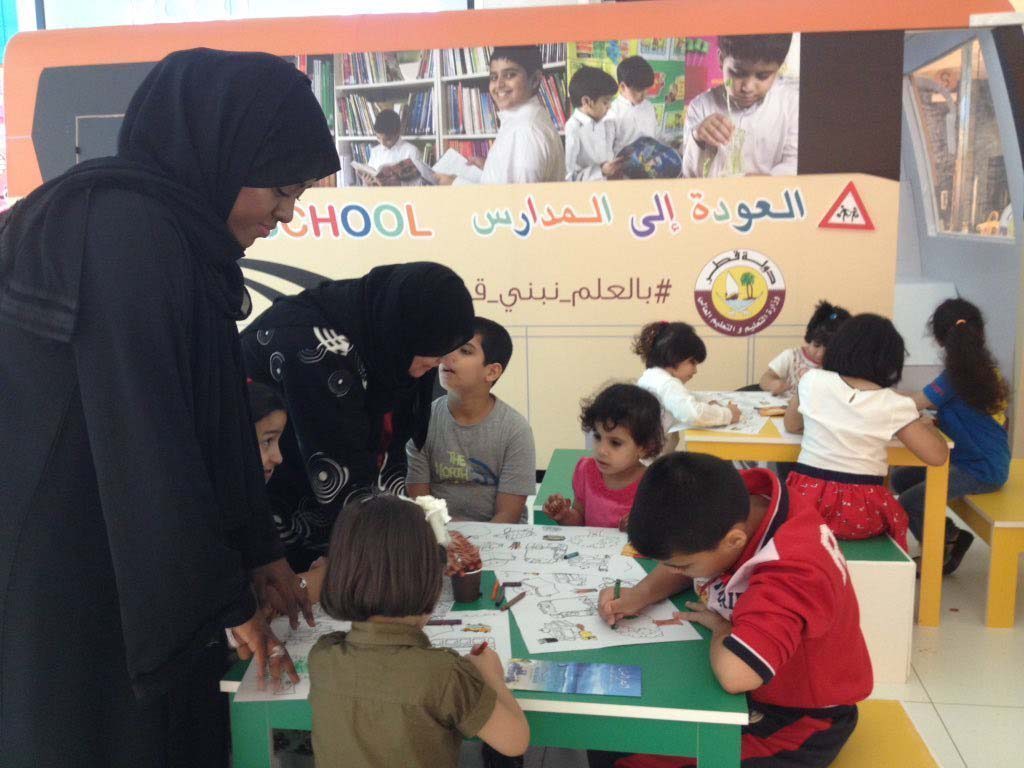
Contrary to rumors on social media, female teachers are not banned from wearing the abaya in local girls’ schools, Qatar’s education ministry has said.
Instead, schools can set their own rules for staff as long as they dress modestly, the Ministry of Education and Higher Education added.
An online furor erupted this week after an independent primary school said in a letter that it had been ordered to ban the abaya on campus.
The notice, dated Sept. 27, was issued by Al-Taawon Independent Primary School for Girls and went viral after being shared on Twitter by a former newspaper columnist.
https://twitter.com/marzoqi_w/status/780862036997709824
In his tweet, Faisal Marzouqi questioned the “legal right or educational reasoning” behind the reported decision, which read:
“To members of the administrative and teaching staff,
We inform you all that based on the meeting headed by Fawziya al-Khatir, Director of Education, with the license holders (owners and managers) of independent schools, the wearing of the abaya is entirely prohibited on campus.Thus, the school administration notifies all members of the necessity of decent and modest attire and for the abaya not to be worn starting October 2016.”
Abaya in the classroom
The school’s decision was apparently made after a meeting between the Director of Education and independent school principals earlier this week, Al Raya reports.
The newspaper cited unnamed school heads as saying as a result of what was discussed, they voluntarily chose to implement an abaya ban on their own campuses.
Speaking to Al Raya, some teachers explained their positions on the matter.

Teacher Hissa Nasir al-Dirham said:
“A female child looks up to her teacher as a second mother. When she sees the teacher in tidy and decent clothes in pretty colors, it has a positive emotional effect instead of always seeing teachers wearing black abayas and shaylas.”
She added however that she supports female teachers wearing abayas while teaching boys, saying, “Male students scrutinize their teachers’ clothing and talk about them even if they’re dressed in decent loose clothes.”
Meanwhile, teacher Maryam Saad al-Bilim said she supported a ban because it would allow staff “to move more easily and comfortably and creates intimacy with the students.”
But Naima al-Ansari, who wears abaya regularly, called for the national dress to be mandatory for teachers.
Ministry clarifies
But in a clarification, Qatar’s education ministry said this week:
وليس هناك قانون يلزم باللبس العبايه من عدمها ومن حق كل مؤسسة تحدد الزِّي الرسمي بما لا يخالف الشرع او العادات والتقاليد
— وزارة التربية والتعليم والتعليم العالي (@Qatar_Edu) September 27, 2016
Translation: There are clear policies regarding decent and modest attire in girls’ and model schools. The administrative and teaching staff comply with such regulations as announced by the ministry.
There isn’t a a decree that mandates the wearing or not wearing of abaya. Each institution has the right to stipulate its own regulations regarding attire as long as religion, norms and traditions are not violated.
However, one commenter challenged this statement, asking why several schools have implemented a ban following a meeting with officials.
وبعدين اشلون مافيه أي تعميم صدر واكثر من مدرسة حاطة رقم التعميم وعندهم الجرأة أنهم يذكرون اسم مديرة الهيئة ؟ حدث العاقل بما يعقل
— شيخة المناعي772 (@Fahrs_alketab) September 27, 2016
Translation: How is it that there are no official instructions issued by the ministry when more than one school has put up the notification with a number and date on it? How is it that they (the schools) have the audacity to drag the name of the director of education into this if indeed this isn’t the ministry’s policy? It doesn’t make any sense!
While some people online said they felt it was beyond the ministry’s remit to dictate how teachers should dress, others called for stricter regulations around what they felt was inappropriate clothing worn by some educators.
https://twitter.com/ghanemqtr89/status/781182059867959296
Translation: Translation: You have no right to ban any person from wearing particular clothes. This is personal freedom and there’s no law that stipulates a uniform for teachers in Qatar.
https://twitter.com/morony5/status/780853745966022659
Translation: There are a lot of schools where teachers are allowed in without a headscarf and wearing tight clothing that show body details, long slits and leggings. There should be a law prohibiting that (instead).
The controversy prompted this cartoon, which calls into question the education ministry’s priorities:
#كاريكاتير
“منع لبس العباءة”#قطر #Qatar #cartoon pic.twitter.com/1hdy0wokt9— سعد المهندي (@S3d_78) September 29, 2016
In it, the poster on the wall reads, “Abayas are banned on campus,” and the man reading it is shown thinking, “Finally, we fixed education!”
Code of conduct
This is not the first time that Qatar’s education authority has waded into the thorny issue of teachers’ attire.
Two years ago, the then-Supreme Education Council (SEC) introduced an updated code of conduct for all teachers in independent schools.

It outlined expected behavior from educators such as “showing respect to parents,” not breaking the law, setting a good example to students and observing local customs and values.
As part of this, teachers were told they must dress modestly, “taking into account the customs and traditions of the workplace and beyond.”
But at the time, the code did not specify what was meant by modest dress.
Thoughts?







